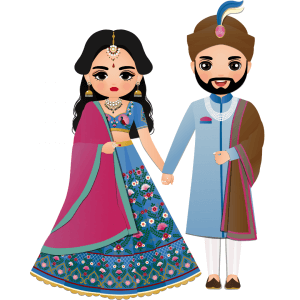Divorce Essentially Means To Dissolve Or Terminate A Marriage Based On Various Grounds And Growing Differences Between The Husband And The Wife After Following The Due Procedure Of Law. There Are Two Kinds Of Divorce Procedures Viz. Divorce By Mutual Consent And Contested Divorce. Since Marriage And Divorce Are Entirely Personal Affairs, The Personal Laws Of Every Religion And The Special Marriage Laws Govern Marriage And Divorce In India. The Divorce Laws In India Governed By Different Personal Laws Based On The Religion Of The Parties Will Be Discussed Further.
Indian Laws For Divorce

The Basic Judicial Process Of Taking Divorce Starts With Filing A Divorce Petition In A Family Court Having Jurisdiction Of The Court Specified By The Governing Law And Stays When The Final Order Or Decree Of Divorce Is Pronounced. The Process Goes Through Several Stages Including Filing The Petition, Issue Of Summons, Responses, Trial, Interim Orders, And At Last The Final Decree Of Divorce. This Process Largely Applies To Every Religion With Some Minor Differences.
The Period Of Separation, Grounds For Divorce, Documents That Need To Be Submitted During A Divorce Proceeding, And In Some Cases The Court Where You File A Divorce Petition Differ Based On Different Religions.
Divorce Under Hindu Laws
Section 13 Of The Hindu Marriage Act, 1955 Deals With Both Types Of Divorces; By Mutual Consent And Contested. The Grounds For Filing A Petition For Mutual Consent Include The Mutual Consent Of The Parties And A Separation Period Of At Least One Year. A Contested Divorce Can Be Taken On Grounds By Either Husband Or Wife That As Desertion, Adultery, Cruelty, Unsound Mind, Venereal Disease, Renunciation, And Either Spouse Has Not Been Heard Of As Being Alive For Over Seven Years. The Wife Alone Has Some Special Grounds Under The Same Section Which Include Sodomy, Rape, Bestiality, Marriage Before Attaining The Age Of 15 Years, And Decree Of Maintenance To The Wife After A Separation Period Of One Year.
The Petition Can Be Filed In A District Court Within Local Limits Having Ordinary Original Civil Jurisdiction As Per Section 19 Of The Hindu Marriage Act, 1955 Along With The Required Documents Based On The Type Of Divorce.

Muslim Laws On Divorce
The Muslim People Can Take A Divorce Through The Judicial Process As Well As The Extra-Judicial Process. Section 2 Of The Dissolution Of Muslim Marriage Act, 1939 Specifies The Grounds For Divorce Where A Woman Can File A Petition For Divorce In A Civil Court Having Jurisdiction, As The Whereabouts Of The Husband Have Not Been Known For At Least Four Years, The Husband Has Neglected The Wife, Imprisonment Of Seven Years Or More, Failure To Perform Obligations, Impotency, Insanity Or Venereal Disease, Cruelty, Marriage Before Attaining The Age Of 15 Years.
As Per The Extra Judicial Processes, There Are Seven Types Of Divorce, The Types Where The Husband Can Take Divorce Is Talaq-E-Sunnat, Ila, Zihar. The Wife Can Divorce According To Talaq-I-Tafweez And Lian. Both The Spouses Can Take Divorce By Mutual Consent As Per Khula And Mubarat. Talaq-E-Biddat Has Ceased To Be A Valid Form Of Divorce After The Passing Of The Muslim Women (Protection Of Rights On Marriage) Act, 2019.

Divorce Laws For Parsis
Section 30, 31, And 32 Deal With The Divorce Provisions Under The Parsi Marriage And Divorce Act, 1936 Based On Various Grounds Like Being Unable To Consummate The Marriage As Per Section 30, Not Being Heard As Alive For Seven Years As Per Section 31 And Refusal To Consummate, Unsound Mind, Pregnancy By Other People Before Marriage, Cruelty, Bigamy, Rape, Unnatural Acts, Adultery, Imprisonment For Seven Years Or More, Venereal Disease. The Necessary Separation Period Is Of Two Years. Section 32B Provides For Divorce By Mutual Consent Where Consent Is Free.
In India, Parsis Can File A Petition Only Before A Special Court Constituted Under Sections 19 And 20 Of The Parsi Marriage And Divorce Act, 1936.

The Special Marriage Act, 1954
This Act Deals With The Marriage And Divorce Of Inter-Community Marriages. Section 27 Of The Special Marriage Act, 1954 Deals With Divorce. Either The Spouse Can File A Petition Of Divorce In A District Court Based On Adultery, Conviction, And Imprisonment For Over Seven Years, Desertion, Cruelty, Unsound Mind Or Mental Disorder, Venereal Disease, Or Disappearance For Seven Years. The Wife Can File For Divorce On The Grounds Of Rape, Sodomy, Bestiality, And Maintenance Decree. Mutual Divorce Can Also Be Taken Under This Act If The Parties Are Living Separately For One Year.

Divorce Lawyer: Roles and Responsibilities
A Divorce Lawyer Plays An Integral Role In Case You Need To File A Divorce Petition Or Related Legal Matters. In General, Sense As Well If There Is A Need For You To Approach The Court Of Law As For Doing So The Assistance Of A Lawyer Is Necessary. If We Specifically Talk About Divorce Lawyers, They Play A Significant Role From Identifying The Underlying Issues To Litigating Your Case In The Court Of Law.
A Divorce Lawyer Helps The Client In Understanding All The Technicalities And Various Provisions Involved And Helps The Client To Make The Best-Suited Decision. Good Divorce Lawyers With Efficient Negotiating Skills Help The Clients Resolve Disputes Related To Divorce, Maintenance, Alimony, Custody And Much More. In Divorce Cases If There Is A Child The Child Custody Case Then Becomes The Major Responsibility Of The Lawyer.
How to file a divorce petition in India ?
Divorce Is Discussed Above In The Article Across All Religions Of Two Types Mutual And Contested And You Need To Keep In Mind The Fact That Whether The Divorce Is Mutual Or Contested The Petition Will Be Filed Accordingly.
The First Step Is To File A Divorce Petition In The Family Court Having Jurisdiction, In The Case Of Parsis The Special Courts Are Set Up Under Sections 19, And 20 Of The Parsi And Marriage Act, 1936. In The Case Of Mutual Divorce, The Separation Conditions Have To Be Met As Per Different Acts And In The Case Of Contested Divorce The Grounds Have To Be Decided First And Then The Petition Is To Be Filed.
The Documents That Are Required For Filling A Divorce Petition In A Mutual And Contested Divorce Are Slightly Different As Under Mutual Divorce There Is A Need To Show Evidence Of Separation, Family Background, Property Details And Assets And Failed Attempts Of Reconciliation And Under Contested Divorce Evidence Supports The Claim Of The Divorce Ground, Apart From That The Address Proofs, Wedding Photographs, Professional And Financial Proofs, Marriage Certificate Are Common To Both.
Once The Petition Is Filed Before The Court, The Court Will Then After Scrutinizing The Petition Will Admit Or Dismiss The Petition, In Case Of Mutual Divorce The Parties Appear Directly And The Petition Is Scrutinized At That Time Itself Whereas In Contested Divorce The Petition Is Scrutinized First And Then The Parties Appear And Further Process Is Commenced.
In The Case Of Muslims, If The Divorce Is Being Taken By The Extra-Judicial Process, It Is Not Necessary That The Divorce Is Filed Rather The Process Is Done In Front Of A Mediator And The Divorce Is Finalized After The Iddat Period Which Equals Three Menstrual Cycles And All The Rules Are Provided Under The Holy Quran.
How can Divorce Mediation help?

Divorce Mediation Is A Mechanism Of Alternative Dispute Resolution Which Aims To Resolve The Dispute Of Divorce In A Marriage Without Doing All The Legalities Required In A Divorce Case. When We File A Petition For Divorce The Court Also Gives Direction For Mediation And Provides A Cooling Period But Divorce Mediation Can Easily Take Place In Front Of A Third Party Called A Mediator Without Even Going To The Court Which Saves A Lot Of Time And Money.
Divorce Cases Are Rapidly Increasing Year By Year In India, The UN Report Titled “Progress Of The World’s Women 2019-20 Revealed That The Divorce Rate Has Doubled In India Over The Past Two Decades. The City Of Mumbai Witnesses 22 Petitions Every Single Day From 2011-2020, Considering The Increase In Divorce Petitions The Importance To Adopt Divorce Mediation As A Viable Alternative That Can Significantly Resolve Disputes Between The Husband And Wife Through Good Communication And Without Any Difficulty. It Can Give A Fair Chance To The Parties To Talk And Resolve All Their Differences, Divorce Mediation Has A Huge Potential For Resolving The Matrimonial Disputes And Saving The Relationships.
Divorce Mediation Is A Very Helpful Procedure As It Can Be Initiated And Completed Without Any Hassle, It Is Comparatively Cost-Effective And Time-Efficient Than The Traditional Method Of Litigation Which Consumes A Lot Of Time And Capital. Divorce Mediation Maintains The Confidentiality Between The Parties Well. In Totality Divorce, Mediation Can Prove To Be An Effective Alternative To Resolving Matrimonial Disputes.
Divorce Mediation through Online Dispute Resolution
Online Dispute Resolutions Provide Alternative Dispute Resolution Services Through Online Means, Making It Even More Convenient To Resolve Disputes Without Going Anywhere. Online Dispute Resolution As A Process Is Economical, Trouble-Free, And Time-Efficient.
WeVaad Is An Online Platform That Provides Services Related To Alternative Dispute Resolutions Online; Arbitration, Mediation, And Conciliation. The Parties Facing Matrimonial Disputes Can Easily File Their Case With WeVaad. The Process Is Entirely Voluntary And The Parties Are Free To Withdraw At Any Moment, We Make Sure Not To Hamper The Confidentiality Of The Parties. We Have Legal Experts Who Can Act As A Mediator And Aid In Resolving Disputes. If You Are Facing Any Matrimonial Issues Feel Free To Reach Out To WeVaad.

